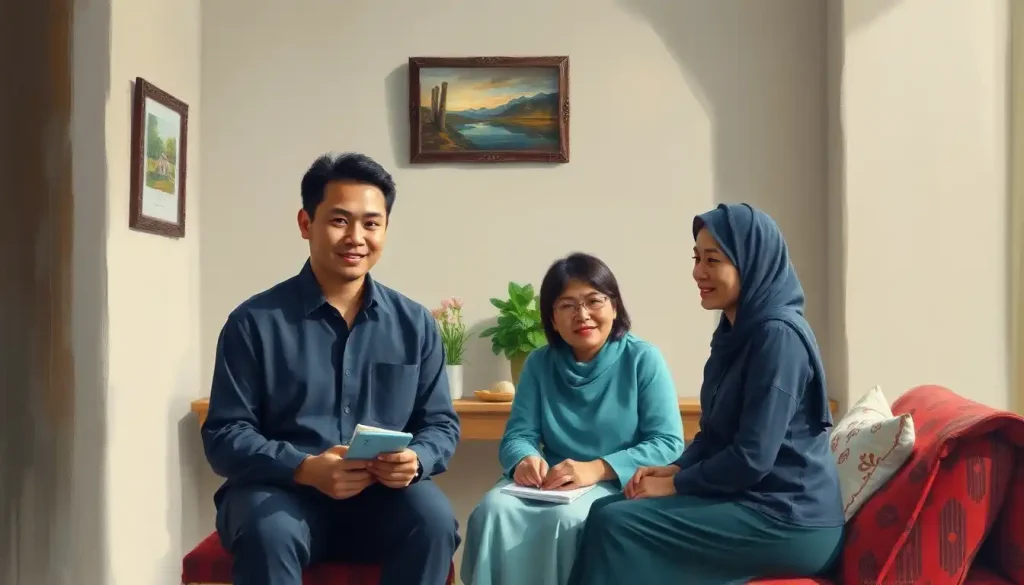Life’s greatest peace of mind comes not from accumulating wealth in Dubai’s glittering metropolis, but from knowing exactly how your hard-earned assets will protect your loved ones when you’re gone. In a city known for its opulence and ambition, it’s easy to get caught up in the pursuit of material success. However, true security lies in planning for the future, especially when it comes to safeguarding your legacy in the United Arab Emirates (UAE).
Estate planning in Dubai is a unique and complex process that requires careful consideration and expert guidance. The city’s diverse population, comprising both locals and expatriates, faces distinct challenges when it comes to preserving and transferring wealth. Whether you’re a long-time resident or a newcomer to this bustling emirate, understanding the intricacies of estate planning is crucial for ensuring your assets are distributed according to your wishes.
Navigating the Legal Landscape: Dubai’s Estate Planning Framework
The UAE’s legal system is a fascinating blend of civil law and Sharia principles, creating a unique environment for estate planning. For Muslims, Sharia law typically governs inheritance matters, dictating specific proportions of an estate to be distributed among family members. However, non-Muslim expatriates have more flexibility in how they can structure their estate plans.
One of the most significant developments in recent years has been the establishment of the Dubai International Financial Centre (DIFC) Wills and Probate Registry. This groundbreaking initiative allows non-Muslims to register wills that follow common law principles, providing an alternative to the default application of Sharia law. It’s a game-changer for many expatriates, offering greater control over asset distribution and guardianship arrangements.
Recent changes in UAE inheritance laws have further expanded options for residents. In 2020, the UAE introduced new legislation allowing non-Muslims to create wills under UAE civil law, rather than being subject to Sharia principles by default. This move has been widely welcomed, as it provides greater clarity and certainty for expatriates planning their estates.
Understanding these legal nuances is crucial when crafting your estate plan in Dubai. It’s not just about writing a will; it’s about navigating a complex legal landscape to ensure your wishes are respected and your loved ones are protected. This is where the expertise of an Estate Planning Attorney Dallas can be invaluable, even if you’re based in Dubai. Their experience in handling complex estate matters can provide insights that are applicable across different jurisdictions.
Building Blocks of a Robust Estate Plan in Dubai
Creating a comprehensive estate plan in Dubai involves several key components, each serving a specific purpose in protecting your assets and ensuring your wishes are carried out.
Wills are the cornerstone of any estate plan. In Dubai, the type of will you create depends on your religious affiliation and personal preferences. Muslims typically follow Islamic inheritance laws, which prescribe specific shares for family members. Non-Muslims, on the other hand, have more flexibility. They can opt for a DIFC will, which allows for greater freedom in asset distribution and guardianship arrangements.
Trusts and foundations are powerful tools in estate planning, especially for high-net-worth individuals. These structures can offer benefits such as asset protection, confidentiality, and tax efficiency. While trusts are less common in the UAE due to the lack of a specific trust law, foundations have gained popularity as an alternative. The DIFC offers a robust legal framework for establishing foundations, making it an attractive option for many residents.
Power of attorney and guardianship arrangements are crucial aspects of estate planning, particularly for those with minor children or dependents. In Dubai, it’s essential to consider both temporary and permanent guardianship arrangements, as well as who will manage your affairs if you become incapacitated.
Tailoring Your Estate Plan to Your Asset Portfolio
Different types of assets require different estate planning strategies. Real estate, for instance, is a significant consideration in Dubai’s property-centric economy. Whether you own a luxury apartment in the Marina or a villa in Emirates Hills, it’s crucial to understand how property ownership and transfer work in the UAE.
For business owners, succession planning is a critical component of estate planning. This involves not just transferring ownership but also ensuring the continuity and success of the business after you’re gone. It’s a complex process that requires careful consideration of legal, financial, and operational aspects.
Investments and financial assets, such as stocks, bonds, and bank accounts, also need special attention in your estate plan. Understanding how these assets will be treated under UAE law and ensuring they’re properly documented in your will or trust is essential.
Expatriate Considerations: Crossing Borders in Estate Planning
For the many expatriates calling Dubai home, estate planning takes on an additional layer of complexity. Cross-border estate planning involves navigating multiple legal systems and tax regimes. It’s not uncommon for expats to have assets in several countries, each with its own inheritance laws and tax implications.
Dealing with assets in multiple jurisdictions requires careful coordination. You may need to create separate wills for assets in different countries or consider establishing an international trust. It’s a delicate balancing act that requires expertise in both UAE and international law.
Tax implications are another crucial consideration for international estates. While the UAE doesn’t impose inheritance tax, your beneficiaries may face tax liabilities in their home countries. Understanding these potential tax burdens and planning accordingly is essential to preserve your wealth for future generations.
If you’re an expatriate in Dubai with ties to Australia, you might find it helpful to consult resources on estate planning in Brisbane or estate planning in Perth. These can provide valuable insights into how your estate plan in Dubai might interact with Australian inheritance laws and tax regulations.
Crafting Your Legacy: Steps to a Comprehensive Estate Plan
Creating a robust estate plan in Dubai is not a task to be undertaken lightly. It requires careful consideration, expert guidance, and a thorough understanding of your unique circumstances.
The first step is to consult with legal and financial experts who specialize in UAE estate planning. These professionals can help you navigate the complexities of local laws, understand your options, and make informed decisions about how to structure your estate plan.
Documenting your estate plan is crucial. This involves not just creating a will, but also potentially establishing trusts, drafting power of attorney documents, and ensuring all your assets are properly accounted for. It’s important to be thorough and precise in this documentation to avoid any ambiguity or potential disputes after you’re gone.
Updating your estate plan regularly is just as important as creating it in the first place. Life circumstances change, laws evolve, and your asset portfolio may grow or shift over time. Regular reviews ensure your estate plan remains aligned with your current wishes and circumstances.
Communication is another key aspect of effective estate planning. While it may be uncomfortable to discuss, sharing your plans with your beneficiaries can help prevent misunderstandings and conflicts down the line. It’s also an opportunity to explain your decisions and ensure your loved ones understand your wishes.
Beyond Dubai: Global Perspectives on Estate Planning
While Dubai’s estate planning landscape is unique, it can be helpful to consider approaches from other jurisdictions. For instance, estate planning in the UK often involves considerations like inheritance tax planning and the use of trusts, which may be relevant for British expats in Dubai.
Similarly, those with connections to Canada might find insights from estate planning in Edmonton useful, particularly when it comes to managing assets across different countries.
For a more comprehensive approach, especially for high-net-worth individuals, working with an estate planning company that offers a range of services can be beneficial. These firms often have expertise in handling complex, multi-jurisdictional estates.
The Road to Peace of Mind
Estate planning in Dubai is more than just a legal necessity; it’s a profound act of love and responsibility. It’s about ensuring that the wealth you’ve worked so hard to accumulate continues to benefit your loved ones long after you’re gone. It’s about creating a lasting legacy that reflects your values and wishes.
The peace of mind that comes with a well-crafted estate plan is invaluable. Knowing that you’ve taken steps to protect your family’s financial future and preserve your legacy can bring a sense of security and fulfillment that far outweighs any material wealth.
In Dubai’s fast-paced, ever-changing environment, it’s easy to get caught up in the present moment. But true financial wisdom lies in looking ahead, in planning for the future with the same diligence and ambition that drives success in the present.
As you navigate the complexities of estate planning in Dubai, remember that you’re not just managing assets; you’re crafting a legacy. Whether you’re a local Emirati or an expatriate from halfway across the world, your estate plan is a powerful tool for ensuring your hard-earned success continues to benefit those you love most.
In this glittering city of endless possibilities, take the time to secure your legacy. Seek expert guidance, understand your options, and create an estate plan that truly reflects your wishes. After all, in the grand tapestry of life, it’s not just about the wealth we accumulate, but the legacy we leave behind.
And as you embark on this journey of estate planning, remember that it’s not a one-time task. Just as Dubai continues to evolve and grow, so too should your estate plan. Regular reviews and updates are essential to ensure your plan remains aligned with your changing circumstances and the ever-evolving legal landscape.
In the end, the true measure of success isn’t found in the towering skyscrapers or luxury cars that Dubai is famous for. It’s found in the lasting impact we have on the lives of those we care about. A well-crafted estate plan is your opportunity to extend that impact far into the future, ensuring that your legacy continues to shine as brightly as the Dubai skyline.
So, as you go about your day in this city of dreams, take a moment to consider your legacy. The peace of mind that comes from knowing you’ve secured your family’s future is truly priceless. In Dubai’s landscape of endless possibilities, make sure your estate plan is as ambitious and forward-thinking as the city itself.
References
1. Dubai International Financial Centre (DIFC) Wills Service Centre. “DIFC Wills.” Available at: https://www.difcwills.ae/
2. Government of Dubai. “Dubai Law No. (15) of 2017 Concerning Administration of Non-Muslim Estates in Dubai and Execution of their Wills.”
3. UAE Federal Decree-Law No. 30 of 2020 amending certain provisions of the Federal Law No. 5 of 1985 on Civil Transactions Law.
4. STEP (Society of Trust and Estate Practitioners). “UAE: New law allows non-Muslims to make wills under local law.” 2020.
5. PwC Middle East. “Middle East Private Business Survey 2019: Next Gen in Family Business.”
6. Deloitte. “The GCC Private Wealth Management Industry: Challenges and Opportunities.” 2020.
7. KPMG. “UAE Family Business Survey 2020: Sustaining Growth in Uncertain Times.”
8. World Bank. “Doing Business 2020: Comparing Business Regulation in 190 Economies.”
9. International Monetary Fund. “United Arab Emirates: 2021 Article IV Consultation-Press Release; Staff Report; and Statement by the Executive Director for the United Arab Emirates.”
10. UAE Ministry of Finance. “UAE Economic Report 2020.”












Would you like to add any comments? (optional)